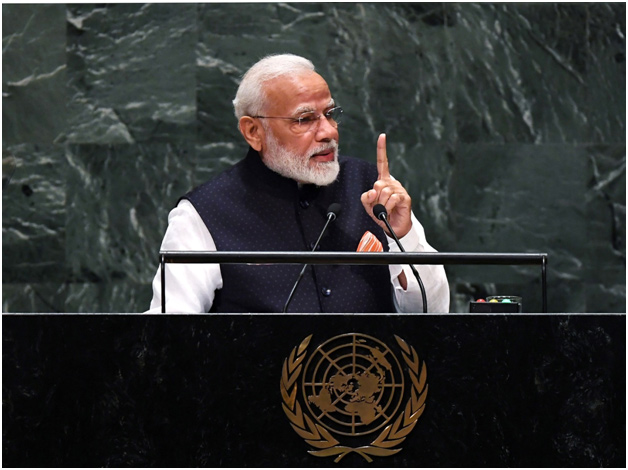Namaskar
Hon’ble Mr. Secretary,
It is a great honour for me to address the 74th Session of the United Nations on behalf of 1.3 billion Indians.
It is a very special occasion, also, because this year, the entire world is celebrating the 150th birth anniversary of Mahatma Gandhi.
His message of truth and non-violence is very relevant for us even today, for peace , development and progress in the world.
Mr Secretary,
This year, the world’s biggest election took place. In the world’s biggest democracy , the highest ever number of voters voted me and my government into power for a second term with an even stronger mandate than before.
And it is thanks to this mandate that I am standing here before you once again.
However, the message that this mandate conveys has an even greater significance, a wider and more inspiring one.
Mr Secretary,
When a developing country is able to successfully implement the world’s biggest sanitation campaign, building over 110 million toilets in just 5 years for its countrymen, all its achievements and outcomes are an inspirational message for the entire world.
When a developing country, successfully runs the world’s biggest health insurance scheme, giving 500 million people the facility of an annual health cover of 500,000 Rs for free treatment; the achievements and responsive systems that result from this scheme show the world a new path.
When a developing country, successfully runs the world’s biggest financial inclusion scheme, opening over more than 370 million bank accounts for the poor in just 5 years, the systems that result, build confidence in the poor across the entire world.
When a developing country, launches for its citizens, the world’s biggest digital identification program, giving them a biometric identity , thereby ensuring they can avail their rights, and saves more than 20 billion dollars by checking corruption, the modern systems that result from it, give the world a new hope.
Mr Secretary,
As I came in here, on a wall at the entrance to this building, I noticed the sign, ‘no more single use plastic’ I am pleased to inform this assembly that even as I am addressing you today, a very large campaign is being implemented across the entire country to make India free of single use plastic.
In the next 5 years, apart from promoting water conservation, we are going to ensure water supply to 150 million homes.
In the next 5 years, we are going to build over 125,000 kilometers of new roads.
By the year 2022, when India celebrates its 75th Independence day, we plan to build 20 million houses for the poor.
Though the world may have set itself the target of eradicating TB by 2030, in India we are working towards eradicating it by 2025.
The question that arises is just how have we been able to achieve all of this. How is it that such rapid changes are taking place in India?
Mr. Secretary,
India is a great culture that is thousands of years old, a culture that has its own vibrant traditions, and which encompass universal dreams. Our values and culture see divinity in every being and strive for the inclusive welfare of all.
Therefore, The very core of our approach is public welfare through public participation and this public welfare is not just for India but for the entire world.
And that is the reason we draw inspiration from our motto : Collective efforts , for growth of all, with everyone’s trust (sabka sath, sabka vikas, sabka vishwas).
And this too, is not confined within the borders of India.
Our endeavours, are neither an expression of pity, nor a pretense. They are inspired by a sense of duty, and duty alone.
All our endeavours, are centered on 1.3 billion Indians. But the dreams that these efforts are trying to fulfill, are the same dreams that the entire world has, that every country has, and that every society has.
The efforts are ours, but their fruits are for all, for the entire world.
And this conviction of mine, gets stronger every day, when I think of those countries, who, just like India, are striving for development, each in their own way.
When I hear about their joys and sorrows, when I get to know about their dreams, my resolve to develop my country at a faster pace gets even stronger, so that India’s experience can be beneficial to these countries.


